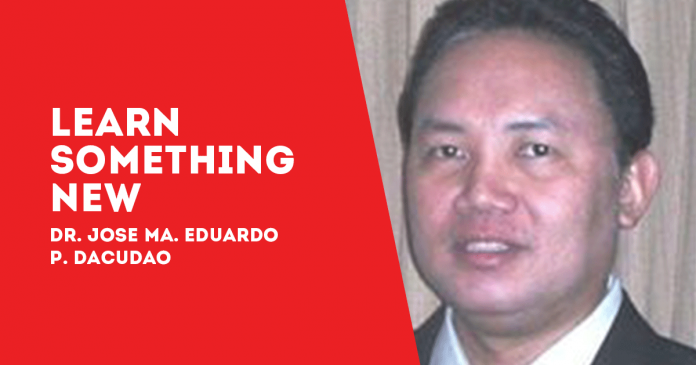
BY DR. JOSE PALU-AY DACUDAO
By experimentation
The aim of an experiment is to generate results, or more observations, that can help support or disprove a hypothesis.
Ex: We wish to test the hypothesis “Gills are inadequate in extracting oxygen from air.”
By observation: We observe that all fishes that have gills solely as their organ for extracting oxygen (in the water) die of hypoxia when exposed in the air.
By experimentation: We replicate the situation above by intentionally taking away thousands of fishes from the water and expose them to air. Our results show that they all die of hypoxia.
Thus, the hypothesis above is strengthened.
In general, a field of study that deals with replicable experiments is regarded as a “physical science” and one that has to rely solely on field observations a “soft science’.
Historical studies (which deal with the non-replicable past) and Social studies (which deal with human societies and individuals that we are prohibited from experimenting with) are often regarded as ‘soft’.
The disadvantage of such a paradigm that distinguishes physical and soft sciences is that it has tended to discriminate against the ‘soft’ sciences, when in reality these specialties are just as important to us.
In other words, we have to recognize that there are areas of study that we cannot or are not allowed to perform replicable experiments on, while keeping in mind that these are just as important to us.
I will give a situation that can be useful to us in our cause to preserve our ethnolinguistic identities:
Empirical fact or observed data: All languages that have been officially taught as an academic subject and used as medium of instruction in schools, are live languages that are being used by their peoples.
Hypothesis/prediction: Teaching a language in schools will protect it from extinction.
Using this hypothesis, Hawaiians and Native Americans have pushed for the teaching of their languages in schools. This can be regarded as an experiment.
Results/ more empirical data: Hawaiian and Native American languages have experienced an increased in their number of speakers, thus protecting them thus far from extinction.
The hypothesis that ‘teaching a language in schools will protect it from extinction’, has now been further strengthened.
Going back to our Philippine setting, we can make the specific hypothesis: Teaching Philippine languages in our schools will protect them from extinction.
How do we test this hypothesis?
We do indeed teach some of our languages in our schools. Then we observe several generations from now if these languages are still alive. We can also have a control, not teaching some other Philippine languages in our schools. If they do die out, our hypothesis is strengthened.
Notice that the issue of right or wrong is not dealt with here.
The situation above is similar to a proposed experiment on a drug that has already been observed to be an effective treatment for a particular disease. A callous experimenter could further strengthen the hypothesis that the drug is indeed effective against the disease by dividing a group of patients with the disease into two, with the first cohort receiving the drug and the second cohort not receiving the drug. The experimenter then waits for the most probable outcome, namely that most of the human subjects in the first cohort would survive, while many of the ones in the second cohort would die.
It’s just too bad if you happen to be in the second cohort.
(Zwichenzug: Most scientists must admit that their training predisposes them to think in a scientific manner. Yet most of them are also persons with a belief in What Should Be. Thus, in most actual trials for new drugs, the experiment is discontinued when it becomes quite clear that the cohort receiving the drug is benefiting from it. The second cohort that initially does not receive the drug is also given it, thus aborting the experiment but saving the lives of the people in the latter group.)
Question is: Are you the totally amoral experimenter, or are you a person who also believes in What Should Be? Would you be willing to let your dying tribe be part of an experiment, knowing full well that it could continue dying, when an obvious solution already exists that could save it? Are you the type of person who would wait for an ethnolinguistic people to die in an experimental trial?
If there is any humanity left in us we would not. Let us therefore lobby for the teaching of ALL Philippines languages in their peoples’ schools, right at the onset, right here, right now./PN







